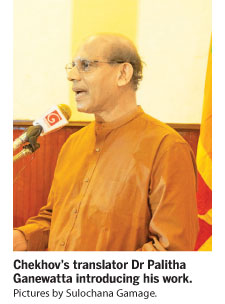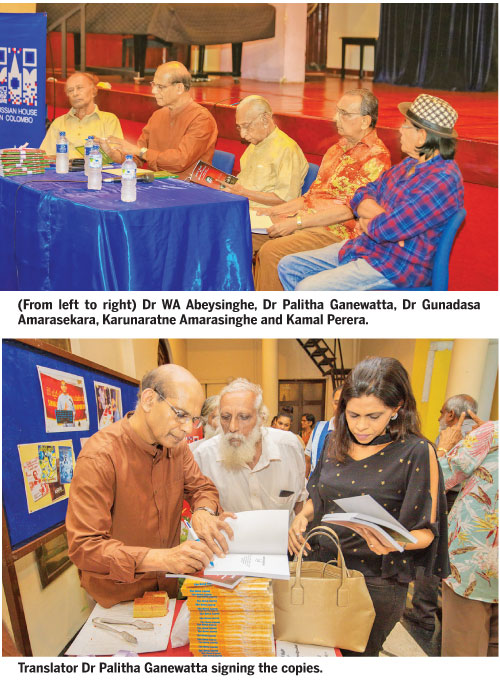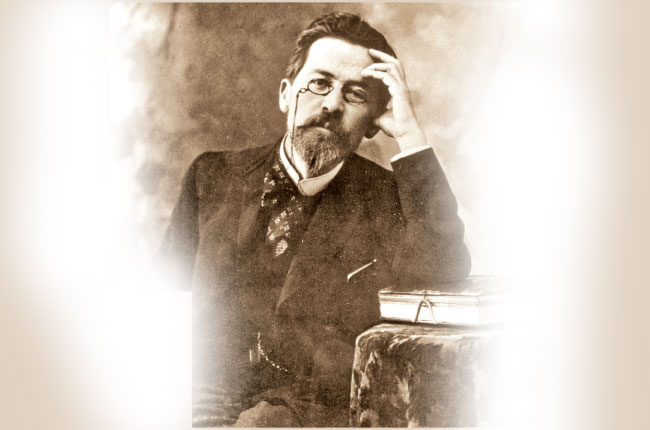Anton Chekhov (1902).
The art of translation is a delicate balance of capturing the essence of a writer’s work while adapting it to a new language and cultural context. Renowned translator, Dr Palitha Ganewatta, has undertaken the arduous task of bringing the timeless works of Russian literary virtuoso Anton Chekhov to Sinhala readers.
 For Dr Ganewatta, the journey of translating Chekhov began during his formative years as a student in Moscow Friendship University. The immersive environment, comprising Russian friends, teachers, media, and cultural exposure, ignited a passion for reading Russian classics in their original language. Reading Chekhov’s stories, witnessing his dramas in Moscow theatres, and exploring Chekhovian museums served as a profound inspiration.
For Dr Ganewatta, the journey of translating Chekhov began during his formative years as a student in Moscow Friendship University. The immersive environment, comprising Russian friends, teachers, media, and cultural exposure, ignited a passion for reading Russian classics in their original language. Reading Chekhov’s stories, witnessing his dramas in Moscow theatres, and exploring Chekhovian museums served as a profound inspiration.
Dr Ganewatta also had the privilege of working alongside Padm Harsha Kuranage and Dadigama Rodrigo, pioneers of Russian translations to Sinhala, at Moscow Radio Sinhala Service. These experiences laid the foundation for their deep engagement with Chekhov’s works.
Stepping stone
 Our protagonist embarked on the translation journey as a third-year university student, initially focusing on Chekhovian comic stories, some of which were published in Sinhala newspapers. In 2004, he published a collection of 18 Chekhovian stories to commemorate the centenary death anniversary of Chekhov. Driven by their curiosity about Chekhov’s medical practice and the presence of medical practitioners as protagonists in his works, Dr Ganewatta published a book titled Doctor Chekhov. In 2019, he translated another collection of Chekhovian short stories, including some previously untranslated works.
Our protagonist embarked on the translation journey as a third-year university student, initially focusing on Chekhovian comic stories, some of which were published in Sinhala newspapers. In 2004, he published a collection of 18 Chekhovian stories to commemorate the centenary death anniversary of Chekhov. Driven by their curiosity about Chekhov’s medical practice and the presence of medical practitioners as protagonists in his works, Dr Ganewatta published a book titled Doctor Chekhov. In 2019, he translated another collection of Chekhovian short stories, including some previously untranslated works.
The latest translations include Chekhov’s Letters and Memories of his Contemporaries, providing a comprehensive understanding of the author and his era.
Translating Chekhov’s works from Russian to Sinhala presented Dr Ganewatta with numerous challenges. Unlike verbatim translations, he aimed to capture the meaning and essence of Chekhov’s prose.
“Chekhov meticulously selected every word, treating his writings as his own children. His careful placement of commas, semicolons, and other punctuation marks added another layer of complexity. The task of finding appropriate Sinhala words that convey the intended meaning was a challenge.”
However, the translator’s proficiency in the Russian language, coupled with understanding of both urban and rural Russian life, helped navigate these obstacles.
Personal correspondence
In his latest translation project, Dr Ganewatta chose to delve into the intimate world of Anton Chekhov through his personal correspondence. Letters of Anton Chekhov to his family and friends provides readers with a unique insight into the inner thoughts, emotions, and experiences of the literary genius.
 Chekhov penned over 4,000 letters throughout his short life, addressing his family, friends, theatre directors, actors, romantic partners, and even his wife, Olga Knipper, during the last three years of his life. Out of this vast collection, the translator meticulously selected 100 letters that vividly reflect Chekhov’s inner world, offering readers a glimpse beyond his literary creations.
Chekhov penned over 4,000 letters throughout his short life, addressing his family, friends, theatre directors, actors, romantic partners, and even his wife, Olga Knipper, during the last three years of his life. Out of this vast collection, the translator meticulously selected 100 letters that vividly reflect Chekhov’s inner world, offering readers a glimpse beyond his literary creations.
While Chekhov’s literary works have captivated audiences for generations, his personal life and lesser-known aspects of his character have remained shrouded in mystery. The letters provide an opportunity to discover Chekhov’s unfiltered thoughts and perspectives, which may not be readily apparent in his published works. Unlike his fictional narratives, the letters reveal Chekhov’s candidness, his joys, his concerns, and his encounters with a diverse range of individuals. Some of the letters, previously censored by Soviet authorities, were only made available after the opening of Russian archives in 2004.
Among these ‘censored’ letters is a remarkable account written by Chekhov to his friend Alexy Suvorine, recounting his encounter with a brown-skinned Hindu woman under the palm trees of Ceylon. Such revelations present a more human side of Chekhov, showcasing his complexity and humanity.
Dr Ganewatta approaches the translation process with utmost dedication and responsibility, aiming to faithfully convey the essence of Chekhov’s writing in Sinhala. Thoroughly immersing themselves in the source text, Dr Ganewatta carefully selects appropriate wording in the target language while considering the socio-economic and cultural context in which the original stories were written. To preserve Chekhov’s unique style, attention is given to sentence length, phrasing, and the creation of the desired mood and tone. The translator’s commitment to remain faithful to Chekhov’s idiosyncratic use of punctuation, including the abundant commas, semicolons, and impressionistic ellipses that punctuate his sentences, ensures an authentic representation of the author’s voice.
Path to follow
As Dr Ganewatta looks toward the future, his commitment to translating Chekhov’s works continues to shape the Sinhalese literary landscape. By introducing original Russian translations, they provide budding writers with a valuable resource and a literary path to follow. The timeless themes and universal truths explored in Chekhov’s works resonate across cultures and time periods, making his writings relevant even in the present day. As society evolves, the messages conveyed by Chekhov’s characters and narratives continue to offer valuable insights into the human condition.
“While Chekhov remains a central focus of my translations, I am interested in exploring the works of other Russian authors in the future. Among the authors are Nikolai Gogol, known for his satirical and surrealistic storytelling, Chinghiz Aitmatov, a Soviet author who delves into the complexities of human relationships, and Sergei Yesenin, a renowned Russian poet.
The diverse themes and styles of these writers offer a new dimension to the translations and contribute to a broader understanding of Russian literature.”
The positive feedback received from readers of the Ganewatta translations has been a source of encouragement and motivation. It is through the support and appreciation of readers that translators find validation for their efforts. The feedback not only influences the translator’s work but also reinforces the importance of their role in bringing foreign literary treasures to a new audience. The positive responses received thus far serve as a testament to the impact and significance of their translations.
“Aspiring translators who look to bring foreign literary works to their native languages must emphasise the importance of extensive language learning. It should not be limited to grammar but also include a deep dive into literature. Understanding the history, culture, and society of the source language is crucial for grasping the true meaning and context of the texts being translated.”
Dr Ganewatta is currently working on Raymond Carver’s short stories. The exploration of Russian writers such as Chinghiz Aitmatov and Sergei Yesenin has offered him exciting possibilities for future translations.
Sachitra Mahendra






